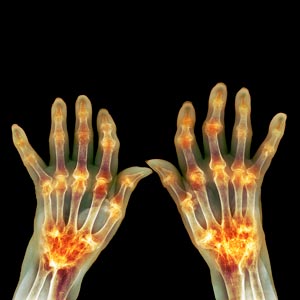Oct. 7, 2016 Research Highlight Medicine / Disease
An unexpected autoimmune connection
A gene not considered a risk factor for disease has been linked to rheumatoid arthritis
 Figure 1: A mutation in HLA-DOA increases the risk of rheumatoid arthritis, an autoimmune disease that causes chronic inflammation of the joints. © Science Photo Library/Getty images
Figure 1: A mutation in HLA-DOA increases the risk of rheumatoid arthritis, an autoimmune disease that causes chronic inflammation of the joints. © Science Photo Library/Getty images
A large study of Japanese people has identified a new gene variant linked to rheumatoid arthritis—a finding that could help reveal the root causes of the autoimmune disease1.
Rheumatoid arthritis, which afflicts up to 37 million people globally, occurs when the body’s immune system mistakenly attacks joints. The condition typically results in swollen and painful joints (Fig. 1), among other symptoms.
The variant found in the study is located in the human leukocyte antigen (HLA) system—a group of genes that regulates many immune functions. But unlike most HLA variants previously shown to raise the risk of rheumatoid arthritis, the newly discovered one is in a ‘non-classical’ HLA gene—one that generally has much less genetic diversity than the ‘classical’ HLA genes that have been associated with many diseases.
“This is one of the first studies to demonstrate a contribution of a non-classical HLA gene to the risk of human diseases,” says Yukinori Okada, a statistical geneticist at the RIKEN Center for Integrative Medical Sciences, who led the study.
Okada and his colleagues used four large data sets of people of Japanese ancestry to look across the HLA region in search of disease-linked variants. Their study included 23,731 healthy controls and 6,244 rheumatoid arthritis sufferers, most of whom had a severe form of the disease marked by the presence of autoantibodies known as ACPAs.
As previously found in studies of Europeans, common variations in the classical gene HLA-DRB1 also showed the most significant disease risk in the Japanese population. Independently, however, a mutation in the non-classical HLA gene HLA-DOA seemed to strongly influence disease development in patients with the severe, ACPA-positive form of rheumatoid arthritis.
The researchers validated this finding in large cohorts of more than 7,000 individuals from East Asia and 23,000 people from Europe. They found that, among Europeans, the disease-linked version of HLA-DOA was often inherited in tandem with the disease-linked version of HLA-DRB1. In contrast, the two variants were mostly independently transmitted among Japanese individuals. (Other East Asians fell somewhere in between.)
Okada’s team also investigated the molecular mechanism by which the mutation in HLA-DOA impacts the development of rheumatoid arthritis. Unlike the variant in HLA-DRB1, which alters an amino acid in the protein encoded by the gene, the variant in HLA-DOA did not change the protein sequence. Instead, a gene expression analysis revealed that the mutation reduced the expression levels of HLA-DOA, a gene normally expressed at high levels in immune-related cells.
Related contents
- Rheumatoid arthritis research shows the potential of large-scale genetic studies for drug discovery
- Pinpointing the origins of arthritis
- A healthy balance
References
- 1. Okada, Y., Suzuki, A., Ikari, K., Terao, C., Kochi, Y., Ohmura, K., Higasa, K., Akiyama, M., Ashikawa, K., Kanai, M. et al. Contribution of a non-classical HLA gene, HLA-DOA, to the risk of rheumatoid arthritis. American Journal of Human Genetics 99, 366–374 (2016). doi: 10.1016/j.ajhg.2016.06.019
